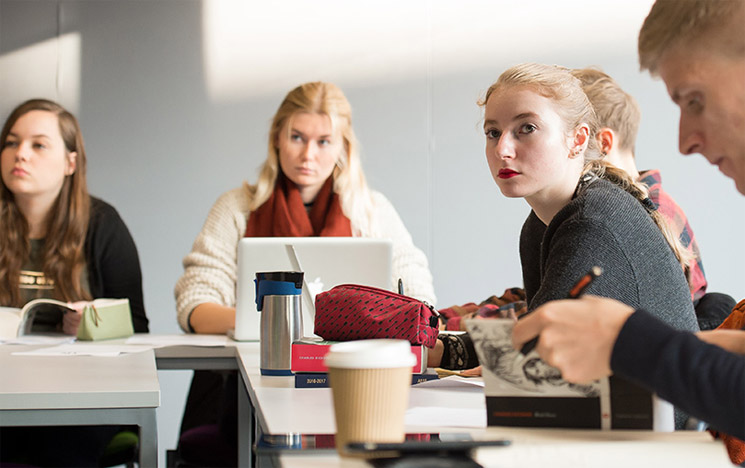English and drama
Whether you're studying abroad at Sussex for a semester or year, you can browse our english and drama modules below, and if you're unsure what to study, follow our top tips for how to choose a module.

Browse our modules
You can see our full list of english and drama modules below.
Year 1
Year 2
-
Autumn Semester
- Advanced Writing Workshop: Process
- Approaches to Discourse
- Critical Thinking and Performance
- Great Ideas about Language
- Inner Worlds: Literature, 800-1750
- Literature and Philosophy
- Making Performance: Practitioners
- Outer Worlds: Literature, 800-1750
- Reading Post-Colonial Texts
- Sociolinguistics
- Sustainability and Climate Justice
- The Art of Short Fiction
- The Novel
- Video Games: Creative & Critical Writing
- Word & Image
- Word & Image
- Writing Fiction
-
Spring Semester
- Advanced Writing Workshop: Technique
- Contemporary Literature and Culture
- English in the United States
- Language, Mind and Brain
- Language in the Workplace
- Language in the Workplace A
- Modernisms
- Phonetics and Phonology
- Regional Variation in English
- Romance
- Romanticism
- Sense and Sexuality: Women and Writing in the Eighteenth Century
- Staging the Renaissance: Shakespeare
- Theatre for Changing Times
- The Politics of Children's Literature
- Writing Poetry
Year 3
-
Autumn Semester
- Class, Culture and Contemporary Writing
- Extra-Terrestrial Cultures: Imagining Outer Space and its Alien Inhabitants
- History of English
- Performance and Research
- Posthuman/Premodern
- Serial Fictions
- Topics in African American Literature
- Topics in Language and Society
- Topics in Linguistics
- Virginia Woolf
- Writing Race, Gender, and the Social: Experiments Beyond Representation
-
Spring Semester
- Applied Research II: Final Project
- Championing Literacy Placement
- Child Language Acquisition
- Decolonisation: Writing, Literature, Politics
- Forensic Linguistics
- Gender, Race and Society in Early Modern Drama
- Modern Nature
- Queer Fictions
- Video Games: Writing, World-Building, Characterisation and Storytelling
Not sure how to choose?
Follow our top tips for choosing your modules. You can also find out about our teaching structure, assessment process and how your credits transfer back to your home institution.
Find out more.
Which school will I study in?
Depending on the module you choose, you'll study in either the English or Drama department, which is part of the School of Media, Arts and Humanities.
Many of our staff have won academic prizes and research awards.
Find out more.
Our literature and language research
Staff at Sussex are working across a multitude of disciplines, informing critical theory and challenging assumptions about language and performance.
Our research influences the way we teach, and you learn from academics at the forefront of their fields.
Find out more.
Contact us
If you are studying at Sussex for a semester or year and have questions, email sussexabroad@sussex.ac.uk.
*The Times and Sunday Times Good University Guide 2021 **The Complete University Guide 2021 ***The Complete University Guide 2021 ****(Our campus is nine minutes by train from Brighton & Hove) survey by accommodation providers Student Living by Sodexo. Rankings based on full undergraduate degree at Sussex.